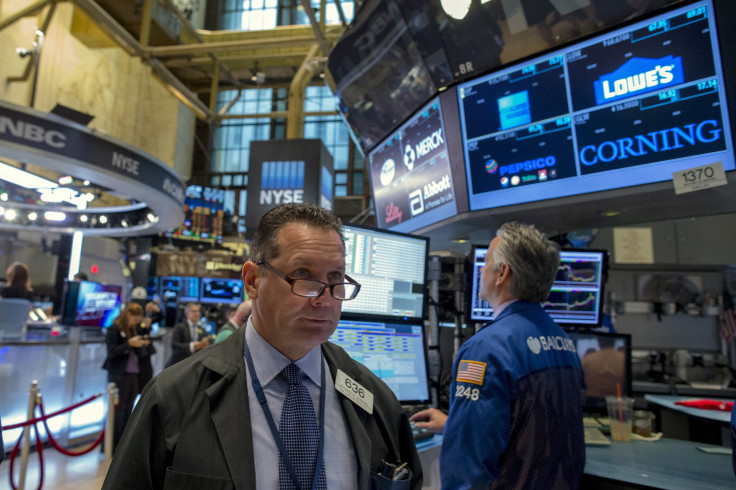Friday's Stock Market Close: US Equities Mostly Fall As Traders Finish Week Of Historic Sell-Offs

KEY POINTS
- The yield on the 10-year Treasury sank to all-time low of 1.127%
- Crude oil plunged to just above $45 per barrel
- Dow fell 13.3% for the week
U.S. stocks mostly dropped on Friday, although the major equity index staged a rally in the final 15 minutes of trading that took away some of the sting of earlier losses fuelled by coronavirus fears.
The Dow Jones Industrial Average plunged 355.72 points to 25,140.92 while the S&P 500 tumbled 24.67 points to 2,954.09 and the Nasdaq Composite Index eked out a gain of 0.89 of a point to 8,567.37.
At one point on Friday the Dow was down more than 1,000 points.
For the week, the Dow dropped 13.3%; the S&P 500 fell 11.5% and Nasdaq swooned 10.5%.
The Dow has plunged 14.9% from its record high close on Feb. 12.
On a percentage basis, the Dow posted its sixth worst week in history. In its worst ever weekly performance, the Dow plummeted 18.2% during the week ended Oct. 10, 2008.
Volume on the New York Stock Exchange totaled 7.82 billion shares with 699 issues advancing, 8 setting new highs, and 2,328 declining, with 935 setting new lows.
Active movers were led by Bank of America Corp. (BAC), General Electric Co. (GE) and AT&T Inc. (T).
Federal Reserve Chairman Jerome Powell said the central bank is watching to see if the coronavirus posed risks to the U.S. economy and vowed to act if necessary.
“The fundamentals of the U.S. economy remain strong,” Powell said. “However, the coronavirus poses evolving risks to economic activity. The Federal Reserve is closely monitoring developments and their implications for the economic outlook. We will use our tools and act as appropriate to support the economy.”
National Economic Council Director Larry Kudlow urged investors to remain calm about the coronavirus and that there was no guarantee cases will “skyrocket” in the U.S. Kudlow said “stocks looks pretty cheap to me.”
China reported 327 more cases of coronavirus, while South Korea confirmed 571 new infections. Germany has quarantined about 1,000 people. Iran reported 143 new coronavirus infections, Nigeria, the most populous country in Africa, confirmed the first virus infection below the Sahara Desert. Over 80,000 people now have been infected by the virus, mostly in China.
St. Louis Fed President James Bullard said on Friday that interest rate cuts were possible if the virus outbreak becomes a global pandemic. But he cautioned that the pandemic scenario "was not the baseline case at this time."
Mayank Mishra, a strategist at Standard Chartered Bank, said: "Previously the market had taken some comfort in the falling infection rates in China as a result of containment measures put in place earlier. But the spread of the coronavirus infection outside China, with clusters emerging in South Korea, Italy and Japan, has increased concerns significantly."
Doug Ramsey, chief investment officer at The Leuthold Group, said “the timing of this [virus outbreak] was just the worst with respect to investor sentiment being elevated. I’m not sure that the market has really priced in the potential economic impact of this.”
In economic news, the Commerce Department said that U.S. personal income climbed by 0.6% in January, above expectations, after edging up a downwardly revised 0.1% in December.
Personal spending rose by 0.2% in January, lower than expected, after advancing an upwardly revised 0.4% in December.
The Chicago PMI index rose to 49.0 in February from 42.9 in January. Any reading below 50 indicates worsening conditions.
The University of Michigan consumer sentiment index for February was upwardly revised to 101.0 from an initial reading of 100.9
Overnight in Asia, markets plunged. China’s Shanghai Composite tumbled 3.71%, while Hong Kong’s Hang Seng dropped 2.42%, and Japan’s Nikkei-225 fell 3.67%.
In Europe markets finished broadly lower as Britain’s FTSE-100 plunged 3.38%, France’s CAC-40 plummeted 4.01% and Germany’s DAX dropped 3.86%.
Crude oil futures plunged 3.91% at $45.25 per barrel and Brent crude fell 0.72% at $50.03. Gold futures slipped 3.66%.
The euro fell 0.25% at $1.029 while the pound sterling slipped 0.5% at $1.2823.
The yield on the 10-year Treasury plunged 13.24% to 1.127% while yield on the 30-year Treasury dropped 6.33% to 1.671%.
© Copyright IBTimes 2024. All rights reserved.





















